
How to Lock Apps on OnePlus 12R to Protect Your Individual Information

How to Lock Apps on OnePlus 12R to Protect Your Individual Information
If you are not a fan of having to go through the process of getting through a pattern or password every time you want to use your phone, the good news is that you don’t have to. There are really just a few Apps on your Android device that have sensitive information you don’t want others getting access to. It would really be great if you could lock those apps individually as opposed to locking the OnePlus 12R device as a whole.
Well, in light of helping you out, this article will address just how you can lock Apps on your device and not have to type in a code every time you want to use the OnePlus 12R device.
Part 1. Why you need to Lock Apps on Android?
Before we get down to the business of locking some of your Apps, let’s look at some of the reasons why you would want to lock certain apps.
- You may simply want better access on your device. Locking certain apps will allow you to easily access the OnePlus 12R device and use it without having to remember passwords and patterns.
- If you are a person who is not good at remembering passwords or patterns, simply locking certain apps will help you not get locked out of your entire device which can cause a lot of problems.
- If your device is used by more than one person, locking certain apps will keep the other users out of information you would rather they didn’t access.
- If you have children, you can eliminate the many accidental in-app purchases by locking the apps your children shouldn’t be on.
- Locking apps is also a good way to keep children from content they shouldn’t be accessing.
Part 2. How to Lock Apps in Android
There is always a good reason to Lock Apps on your device and we have two easy and effective methods you can use to do this. Choose the one that you are most comfortable with.
Method One: Using Smart App Protector
Smart App Protector is a freeware that allows you to lock specified applications.
Step 1: Download and Install Smart App Protector from the Google Play Store and Launch it. You may be required to install a helper application for Smart App Protector. This helper will ensure that the many App services running on your device will not be killed by third party apps.
Step 2: The default password 7777 but you can change this in the Password & Pattern Settings.

Step 3: The next step is to add apps to the Smart App Protector. Open the Running Tab on Smart Protector and tap on the “Add” button.

Step 3: Next, select the apps you would like to protect from the pop up list. Tap on the “Add” button once you have chosen your Apps.
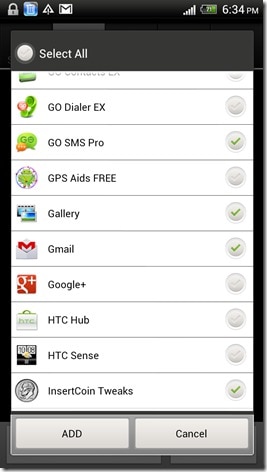
Step 4: Now close the app and the Apps chosen will now be password protected.
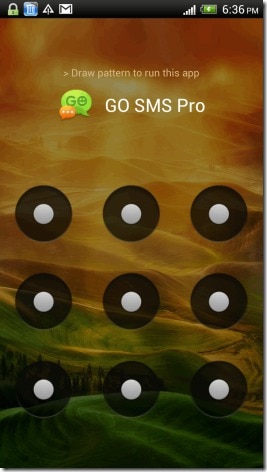
Method 2: Using Hexlock
Step 1: Download Hexlock from the Google Play Store. Once it is installed, open it. You will be required to enter a pattern or PIN. This is the lock code that you will use every time you open the app.
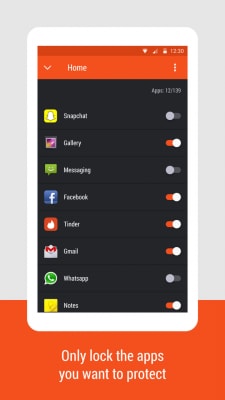
Step 2: Once the PIN or Password is set, you are now ready to lock apps. You can create multiple lists of Apps to be locked ba_x_sed on your different needs. As an example, we have chosen the Work panel. Tap on “Start Locking Apps” to start.
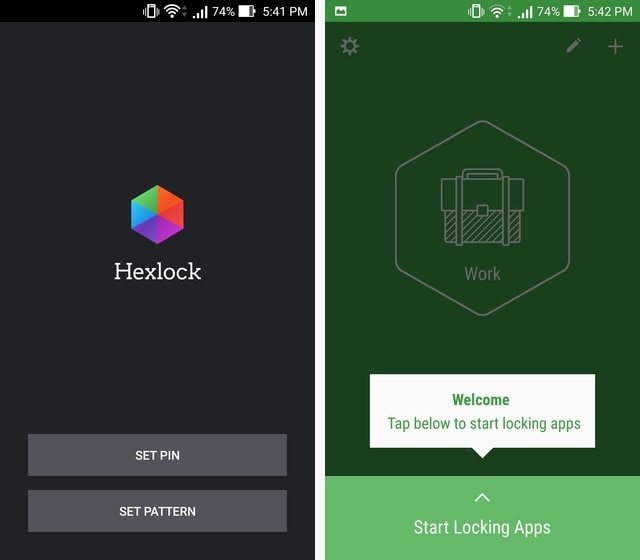
Step 3: You will see a list of Apps to choose from. Choose the Apps you wish to lock and then Tap the down arrow in the upper left when you are done.
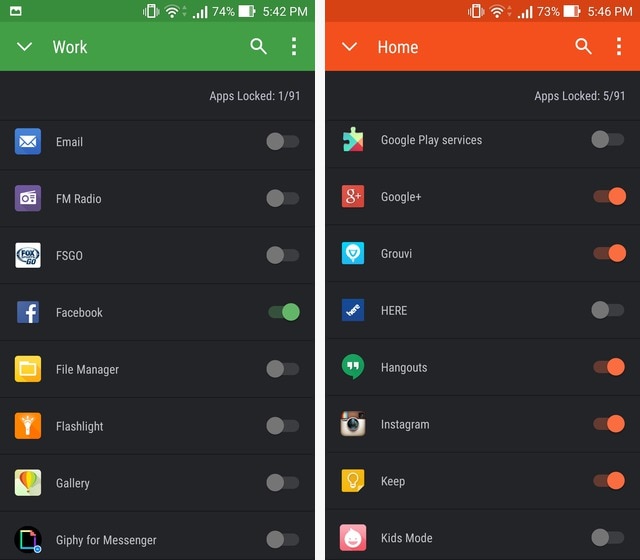
You can then Swipe to the left to move to other lists such as “Home” and proceed to lock apps in this group as well.
Part 3. 6 Private Apps that you should lock on your Android
There are certain apps that may require to be locked more than others. Of course the choice of which apps you should lock will depend on your own uses and preferences. The following are some of the apps you would like to lock for one reason or another.
1. The Messaging App
This is the application that allows you to send and receive messages. You may want to lock this app if you use your device to send messages of a sensitive nature that you would rather keep private. You may also want to lock this app if your device is used by more than one person and you don’t want other users reading your messages.

2. Email App
Most people use individual email applications such as Yahoo Mail App or Gmail. This is another critical one if you are going to protect your work emails. You may want to lock the email app if your work emails are sensitive in nature and contain information that is not for all individuals.

3. Google Play Services
This is the application that allows you to download and install applications to your device. You may want to lock this one if you are trying to prevent other users from downloading and installing further apps to your device. This is especially valuable if your device is utilized by children.
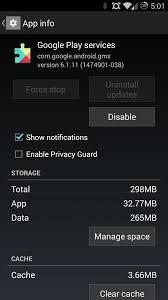
4. Gallery App
The Gallery app displays all the images on your device. The main reason you may want to lock the Gallery app may be because you have sensitive images that are not suitable for all viewers. Again this is ideal if children make use of your device and you have images that you would rather they didn’t see.
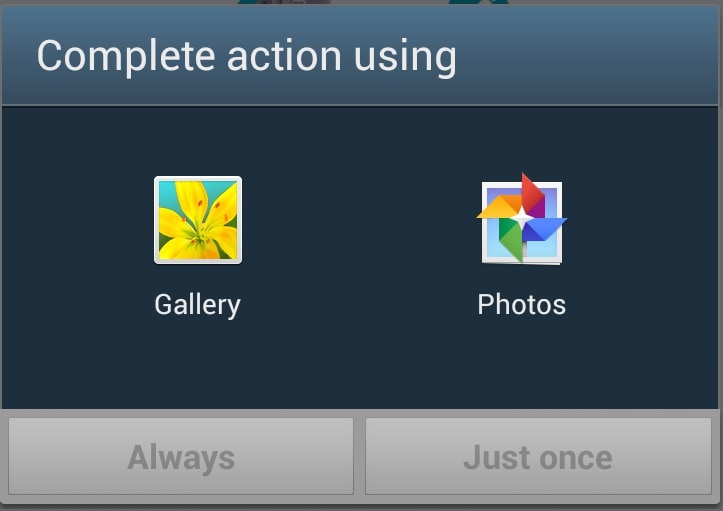
5. Music Pla_x_yer App
This is the Application that you use to play the music on your device. You may want to lock it if you don’t want anyone else making changes to your saved audio files and playlists or don’t want someone listening to your audio files.
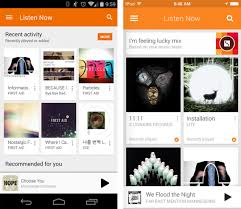
6. File Manager App
This is the App that displays all of the files that are saved on your device. It is the ultimate app to lock if you have sensitive information on your device that you would rather not share. Locking this app will ensure that all of the files on your device will remain safe from prying eyes.
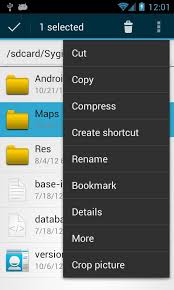
Having the ability to lock your Apps is an easy way to keep information out of the limelight. It also allows you to take full control of your device. Try it, it might just be freeing as opposed to locking your entire device.
Mastering Lock Screen Settings: How to Enable and Disable on OnePlus 12R
In the modern world, the use of smartphones has become such a common trend that everyone would feel abnormal if they don’t have a smartphone of their own. So big the demand is that all IT companies are trying their best to introduce as well as innovate several excellent brands of smartphones. To support the function of smartphones, by far there have been numerous operating systems existed. Among them, Android is one of the most popular as well as trustworthy OS.
Just like any other smartphone, all Android devices have their ways to protect the data stored inside a smartphone from being corrupted or leaked. One of the simplest and most easy-to-use ways is to make use of the lock screen.
The lock screen has proved to be a traditional yet efficient way to help you protect your Android phones. In this article, we will provide you with an informative piece of writing about everything you need to know when it comes to the Android lock screen, and ways to enable and disable it.
If you have spent time searching and looking for features of your Android devices, you will find the process of enabling a lock screen is a piece of cake.
· Step 1: On the main screen of your Android devices, tap on the gear icon - which is the icon representing the Settings menu. Once you have chosen it, you will see a drop-down menu on the screen. In the options provided, tap on the Security bar.
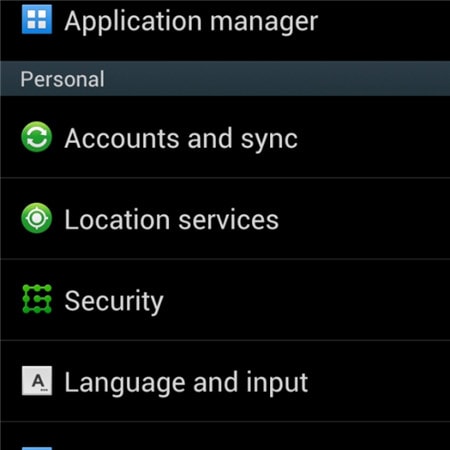
· Step 2: Under the tab whose heading is entitled Screen Security, tap on the first bar in the list called Screen lock.
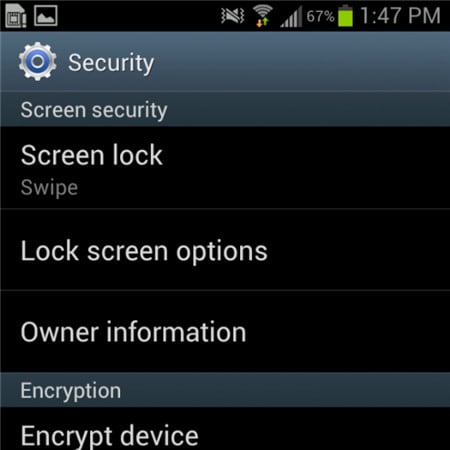
· Step 3: Once the step is done successfully, Android will give you plenty of choices about ways to lock your Android devices’ screens. Among these ways, select one particular type which you feel is most convenient as well as free-risk. After that, type in your PIN code to confirm the choice and finally activate your lock screen feature as you wish.
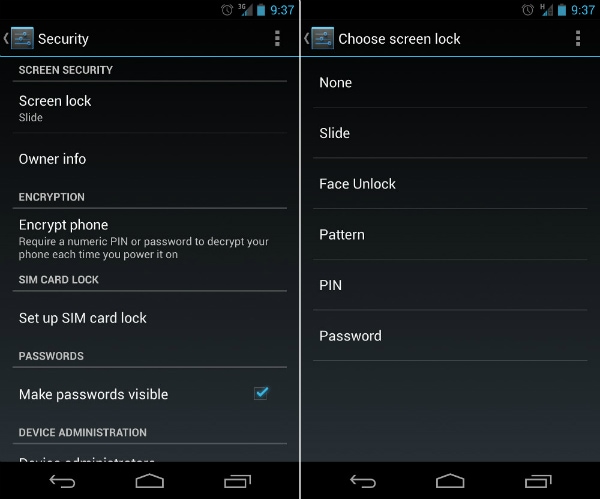
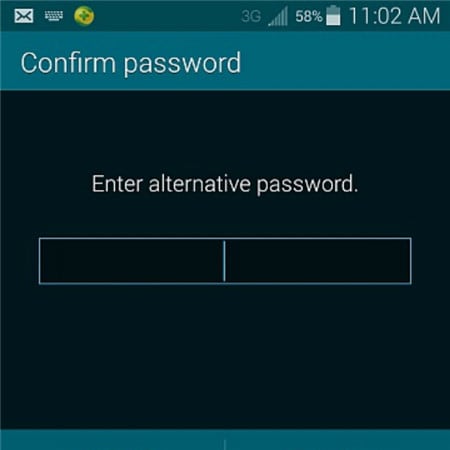
Part 2: How to Disable Android Lock Screen
To certain customers, the lock screen can do more harm than good, and they would prefer to disable the screen lock on their Android devices. This process is also an easy one to follow, as long as you still hold good memory of the security code.
· Step 1: On the main screen of your Android devices, tap on the gear icon. It will directly lead you to the Settings menu of the phone. After that, a drop-down menu will appear with several choices and bars. Among them, tap on the Security option to begin your work.

· Step 2: Under the heading called Screen Security heading, you will be shown 3 choices. Tap on the first one, which is entitled Screen lock.
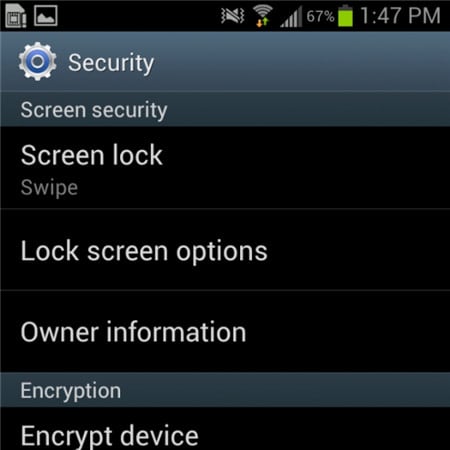
· Step 3: Once you have done the previous step, a brand new screen will appear and then you will be asked to fill in your PIN code. This is a step that helps guarantee that you are the true owner of the Android device.
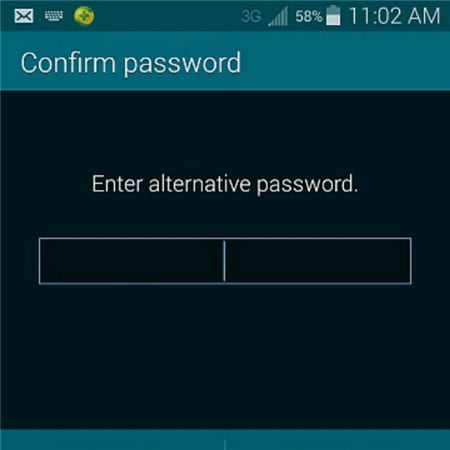
Step 4: As soon as you have confirmed the right PIN code in the bar provided, you will then be presented to the next drop-down menu. A similar screen will appear which shows you plenty of choices. Tap on the top of that list, which is a bar called None.
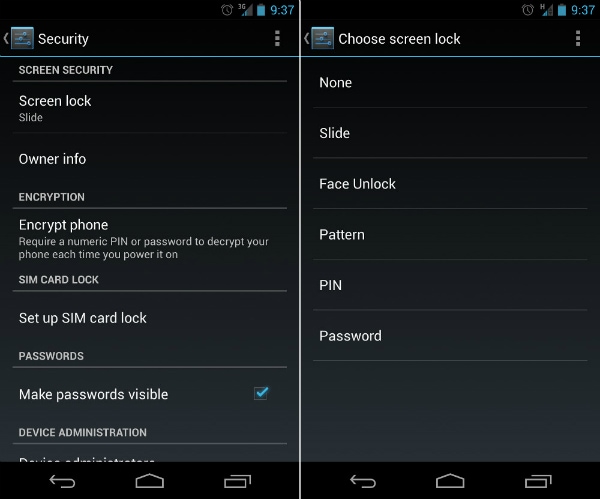
Step 5: In the end, you have successfully disabled the screen lock on your Android devices. You are now capable of using it without any hesitation about the screen lock.
Part 3: Common Problems of Disabling Lock Screen
The process to disable the screen lock on Android may seem easy to handle as well as straightforward to several customers, but there are still some annoying problems that users have to deal with while trying to disable the lock screen.
What are the top 2 common problems?
Below are the two most common problems faced by Android users during their efforts to disable the feature of screen lock.
1. In the Screen Security choice, the None bar can not be chosen.
Description of the problem: There is a sentence below it stated: “Disabled by administrators, encryption policy or credential storage”. All the space of the None option is in white and grey.
The solution to this problem is quite simple. Once you have made sure you are suffering from this nasty one, try to follow these below pieces of advice to see if it is capable of giving you a hand.
Step 1: Open the Settings menu from the main screen. Then tap on the Credential Storage. You will see a drop-down menu like the screenshot below.
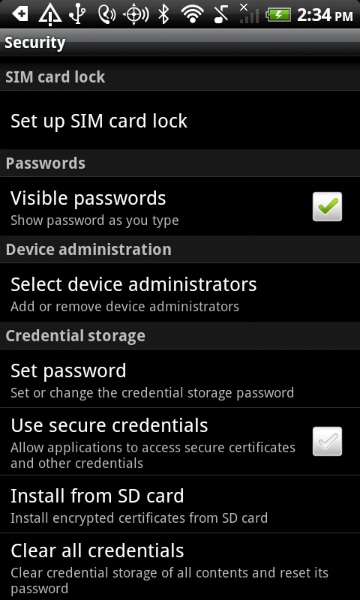
Step 2: Continue to tap on the Clear Credentials (Remove all certificates) option. Then next click on the OK button. Wait for some seconds until your Android device has finished the process.
Step 3: To make sure that the previous step has been performed successfully, try looking at the bottom of the drop-down menu. If the Clear Credentials (Remove all certificates) are grey out and can not be selected, then you have managed to do it.
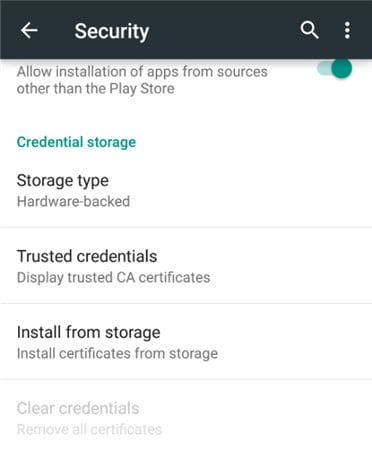
Step 4: Now that the problem is solved, you can feel free to turn back to your Screen lock option in the beginning and disable the feature of locking screen Android as usual.
2. You have mistakenly encrypted your SD card. You want to disable the encryption, only to realize that it requires you to set a new screen lock code. But when you come to the Screen lock menu, all the options but Password have been greyed out.
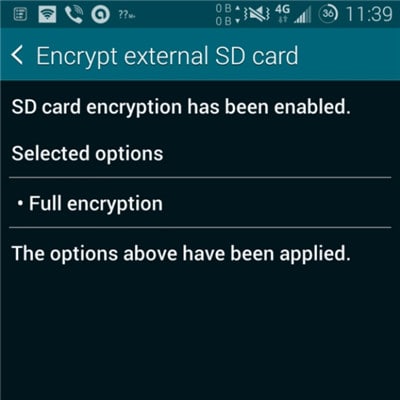
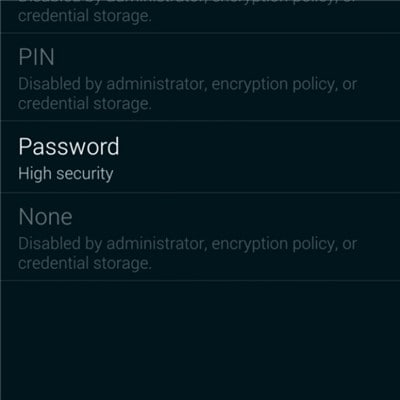
This is pretty weird, but actually, it is one of the most common troubles that many users have complained about. But to your surprise, the solution is very simple and easy. All you have to do is to reset your password, but with a little change. Your password MUST include at least ONE NUMBER in it. Confirm your new password then you will be able to disable the lock screen Android as usual.
Bonus Tip: Remove Android Screen Lock If Forgotten Password/Pattern
As much as the lock screen can protect the personal information on the phone, it can also cause much trouble if you forget the lock screen password or enter the wrong password too many times. So here comes the need for phone unlocking software . One of the best is Dr.Fone - Screen Unlock (Android), which can help us bypass forgotten Android screen locks without any data loss(limited to Samsung and LG series phones). Other Android brand phones will be wiped out all the data once starting to unlock with Dr.Fone
Dr.Fone - Screen Unlock (Android)
Remove 4 Types of Android Screen Lock without Data Loss
- It can remove 4 screen lock types - pattern, PIN, password & fingerprints.
- One-time payment for unlimited use of multiple devices within a specified time period.
- Work for Samsung Galaxy S/Note/Tab series, LG G2/G3/G4, etc.
- Besides, unlocking the screen lock, it also works best to unlock the Samsung FRP lock in devices with Android 5.0 and higher.
3981454 people have downloaded it
Steps on How to Unlock Forgotten Password in Android Phones
Step 1: Launch Dr.Fone and click on Screen Unlock from the primary window.

Step 2: Connect your Android device to the computer via USB cable. The program will recognize the phone directly. Select the phone model or “I can’t find my device model from the list above” to continue.
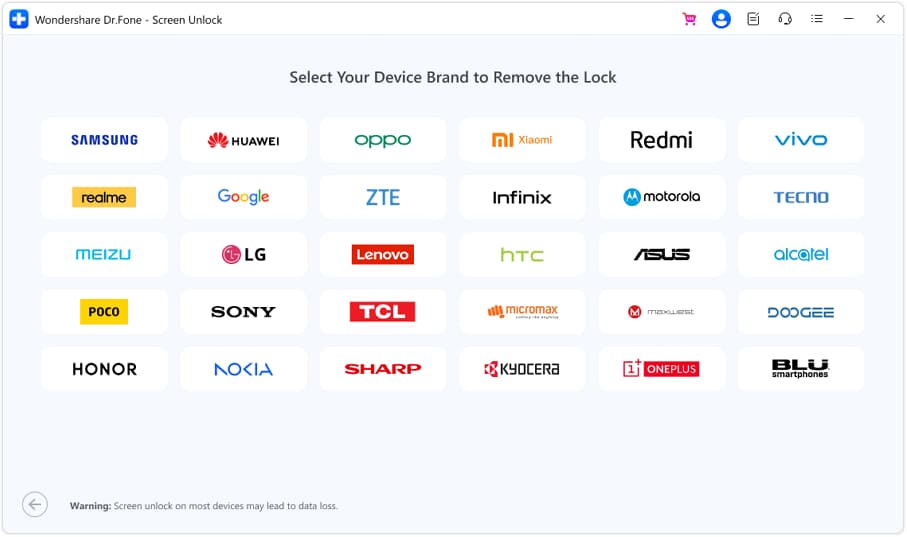
Step 3: Follow the instruction on the program exactly to set the phone to Download Mode. First, you will need to Power off your Phone. Secondly, Press on Volume Down, Home button, and Power button simultaneously. Thirdly press the Volume up button to navigate until the phone enters Download mode.
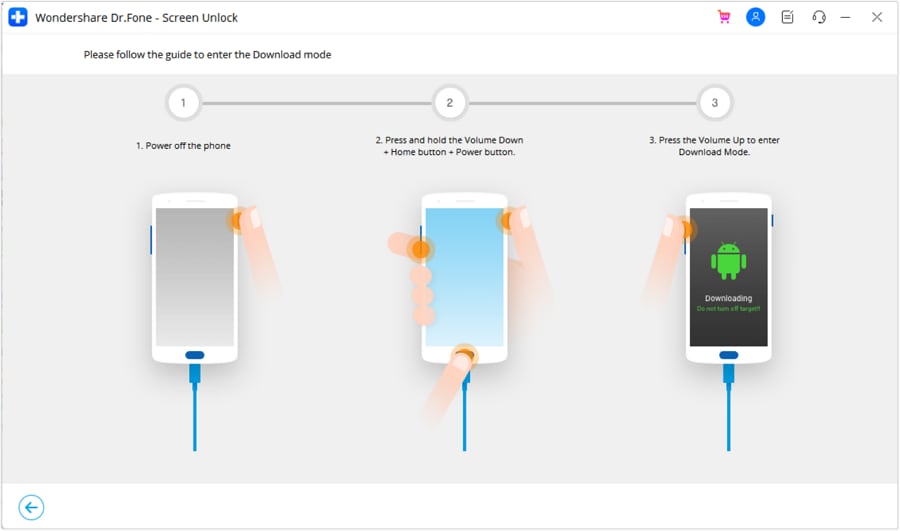
Step 4: After you set the phone to Download mode, it will begin to download the recovery package. When the recovery package is downloaded successfully, the lock screen on your OnePlus 12R devicewill be removed. You won’t lose any data during the whole process.
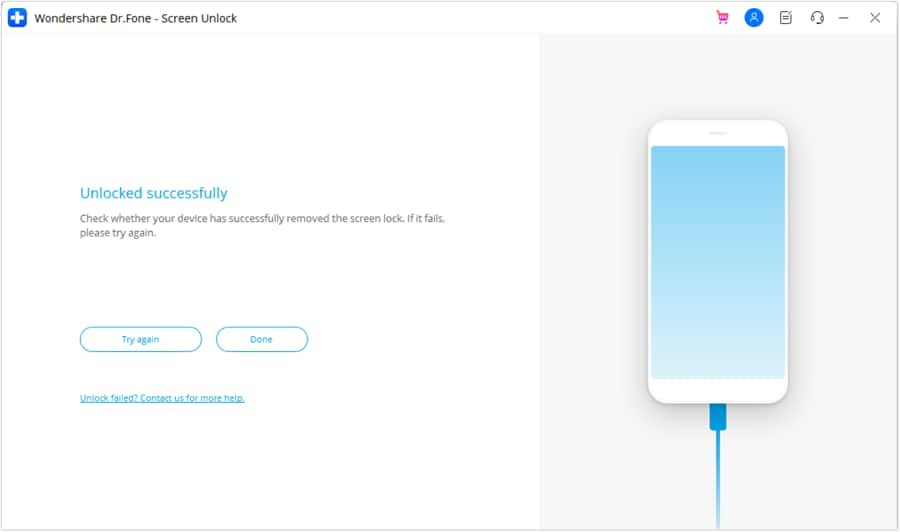
Best OnePlus 12R Pattern Lock Removal Tools: Remove Android Pattern Lock Without Losing Data
In the digital age, our smartphones have become an integral part of our lives. They contain a wealth of personal information, from contacts and messages to photos and sensitive financial data. But what happens when you forget your phone’s lock screen password or pattern? It’s really irritating, right?
Yes, the locked pattern is such a problem that can’t let you access to your phone. You may worry about losing all your data or having to perform a factory reset. However, there are several pattern lock removal tools available that can help you regain access to your device without losing any of your valuable data. Two popular options are Dr.Fone - Screen Unlock (Android) and Android Multi Tool. In this article, we will compare these two tools to help you decide which one is right for you.
Part 1: Remove Pattern lock with Dr.Fone - Screen Unlock
Note that you can unlock your android lock screen by a hard reset, but it will cost all the data on the phone. You won’t have any data on your phone after a hard reset. So you can avoid this problem with pattern lock remover tools. Now we have picked up a great android pattern lock remover named Dr.Fone - Screen Unlock (Android) by Wondershare.
Dr.Fone - Screen Unlock (Android) is a comprehensive software developed by Wondershare that specializes in unlocking Android devices. It offers a user-friendly interface and a wide range of features to help you bypass lock screens on various Android devices. With Dr.Fone - Screen Unlock (Android), you can remove passwords, patterns, PINs, and even fingerprints from your Android device in just a few simple steps. The software supports a wide range of Android brands, including Samsung, LG, HTC, Motorola, and more. Additionally, Dr.Fone - Screen Unlock (Android) ensures the safety of your data throughout the process, so you don’t have to worry about any data loss or privacy breaches.

Dr.Fone - Screen Unlock (Android)
The Best Android Pattern Lock Remover for Your Locked Android Phones
- 5 screen lock types are available: pattern, PIN, password, fingerprints & Face ID.
- Except for screen locks, it also supports bypassing Google FRP on Samsung, Xiaomi, Redmi, Oppo, Realme, Vivo.
- Save you from ending up with a locked phone after too many pattern attempts.
- Provide specific removal solutions to promise good success rate.
Now we will look at the functionalities that are needed in order to unlock your Android pattern lock.
4,008,669 people have downloaded it
How To Unlock Android Patterns with Dr.Fone - Screen Unlock (Android)?
- Step 1. Start Dr.Fone on your PC and then click on “Screen Unlock”. This feature will remove your password from the pattern screen and let you access your phone. After you have accessed Screen Unlock > Android, continue to select the Unlock Android Screen option.
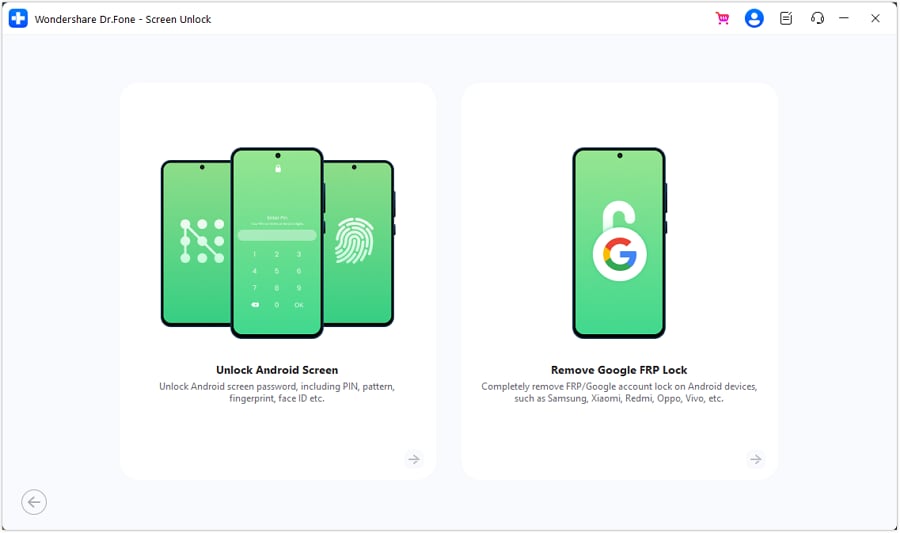
- Step 2. Select Your Device’s Brand to Remove Lock. This tool can remove the Android lock screen without data loss for select Samsung devices, such as S5, Note 4, etc. Actually, you can also use this tool to unlock other Android phones including Huawei, Lenovo, Xiaomi, etc., the only sacrifice is that you will lose all the data after unlocking.

- Step 3. Now you have to take your Android phone to download mode. To do that, you have to follow the guidelines given below: Make sure that your phone is switched off. You will have to press and hold 3 buttons at the same time. They are – Volume down, home, and power buttons. You could go into download mode by pressing the volume up button.

- Step 4. Just after getting onto the download mode, your phone will start getting the recovery package. You will have to wait until the completion of the downloading.
- Step 5. After the downloading is complete, you will now notice that Android Pattern Lock removal process has been started automatically. Don’t worry about your data on your phone, as the pattern lock screen removal will not erase any data from your phone. After the removal process, you can access your phone as per your desire.

Part 2: Remove Pattern Lock with Android Multi Tool
Now we have another pattern lock remover named Android multi-tool. Android Multi Tool is an open-source software that provides similar functionality to Dr.Fone - Screen Unlock (Android). It allows you to bypass lock screens on Android devices and offers additional features such as resetting Gmail accounts and wiping data on your device. It supports devices from various manufacturers, including Samsung, Sony, HTC, and more. Take a look at its features:
- It can unlock different types of lock screens such as pattern, password, PIN, face lock, etc.
- The tool can reset your set without losing data.
- It can run on PC and work on Android devices smoothly.
How to Unlock Pattern lock with Android Multi Tool?
Here are the step-by-step guidelines for unlocking a locked screen.
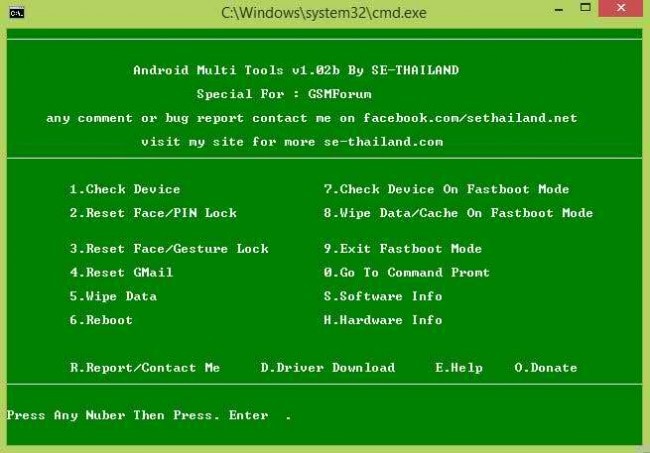
- Step 1. Download the latest version of the tool on your PC and run it there.
- Step 2. SConnect your Android phone to your PC via USB cable. Make sure that your Android device is connected to your PC properly. Otherwise, it will not work.
- Step 3. SAfter running the Android Multi tool on your PC, you will see onscreen instructions like different numbers for different functions. Press on a number for which action you want to perform. For unlocking patterns, there is a numbering button so you will go for that.
- Step 4. SYou will see that your phone has started rebooting after pressing a specific button. Wait until you see it starts automatically. When the phone will start, you could use it without any problem. Good thing is that this tool also does not delete data while unlocking your pattern lock.
Part 3: A Comprehensive Comparison: Dr.Fone - Screen Unlock (Android) vs. Android Multi Tool
Well, you have come to know great things about the two pattern lock remover tools: Dr.Fone - Screen Unlock and Android Multi Tool.
Now, take a look at these tools’ comparison.
| Features | Dr.Fone - Screen Unlock (Android)  |
Android Multi Tool |
|---|
| Unlock pattern locks without deleting data | Yes | Yes |
| Easy to use | Yes | Technical skills required. |
| High-success Rate | Yes | This tool may sometimes not work. |
One of the standout features of Dr.Fone - Screen Unlock (Android) is its simplicity. The software is designed to be easy to use, even for those with little technical knowledge. It offers step-by-step instructions and clear on-screen prompts to guide you through the unlocking process. Compared to Dr.Fone - Screen Unlock (Android), Android Multi Tool is more suitable for tech-savvy users who have experience with command-line tools and are comfortable working with complex software.
One key advantage of Android Multi Tool is its compatibility with a wide range of Android devices. However, it’s worth noting that due to its open-source nature, Android Multi Tool may not receive regular updates and bug fixes, which could potentially lead to compatibility issues with newer Android versions.
In terms of customer support, Dr.Fone - Screen Unlock (Android) excels. It offers 24/7 customer support through email, live chat, and phone, ensuring that you receive prompt assistance whenever you encounter any issues. Android Multi Tool, being an open-source software, relies on community forums and user-generated content for support, which may not be as reliable or timely.
When it comes to pricing, both Dr.Fone - Screen Unlock (Android) and Android Multi Tool offer free trials, allowing you to test their features before making a purchase. Dr.Fone - Screen Unlock (Android) offers flexible pricing plans, including a one-time payment option and a yearly subscription.
Conclusion
In conclusion, forgetting the pattern lock on your Android device can be a stressful situation, but with the help of these pattern lock removal tools, you can easily regain access without losing any data. If you are looking for a user-friendly and reliable tool to unlock your Android device, Dr.Fone - Screen Unlock (Android) is the recommended choice. Its intuitive interface, comprehensive features, and excellent customer support make it a standout option. However, if you are a tech enthusiast who is comfortable working with complex software and prefer an open-source solution, Android Multi Tool can also be a viable option. Ultimately, the choice depends on your technical expertise and personal preferences
Whether you prefer user-friendly software like Dr.Fone – Screen Unlock (Android) or advanced command-line tools like Android Multi Tools, there is a solution available for every user. Remember to always choose a reputable tool and follow the instructions carefully to ensure a smooth and successful unlocking process.
Also read:
- [New] 2024 Approved Perfecting Projects A Deep Dive Into YouTube Studio Editor
- [Updated] Dive Into YouTube TV Tips & Tricks for Optimal Viewing
- [Updated] Ideal Choices Priority 6 FB Lite Vids for 2024
- 6 Proven Ways to Unlock Poco X6 Pro Phone When You Forget the Password
- Can I Bypass a Forgotten Phone Password Of Motorola Moto G34 5G?
- Expert Tips for Stopping Stealthy Android Application Operations in the Background
- How Can I Play Spotify Simultaneously With a Friend?
- How To Remove or Bypass Knox Enrollment Service On Oppo Find X6 Pro
- How to Reset a Locked Nubia Red Magic 8S Pro+ Phone
- How To Unlock Any Honor X9b Phone Password Using Emergency Call
- How to Unlock Oppo Phone with Broken Screen
- In 2024, 10 Easy-to-Use FRP Bypass Tools for Unlocking Google Accounts On Realme Narzo N53
- In 2024, Best Ways on How to Unlock/Bypass/Swipe/Remove Realme 11 Pro Fingerprint Lock
- In 2024, How to Transfer Data from Lava Yuva 3 Pro to Any iOS Devices | Dr.fone
- In 2024, Planning to Use a Pokemon Go Joystick on Xiaomi Redmi K70 Pro? | Dr.fone
- Master the Art of Awkward Potion Creation in Minecraft - Tutorial Inside
- Your Next Novel Awaits: Dive Into These Top 5 AI-Powered Reading Sites
- Title: How to Lock Apps on OnePlus 12R to Protect Your Individual Information
- Author: Aaron
- Created at : 2024-12-22 16:01:02
- Updated at : 2024-12-28 16:31:11
- Link: https://easy-unlock-android.techidaily.com/how-to-lock-apps-on-oneplus-12r-to-protect-your-individual-information-by-drfone-android/
- License: This work is licensed under CC BY-NC-SA 4.0.